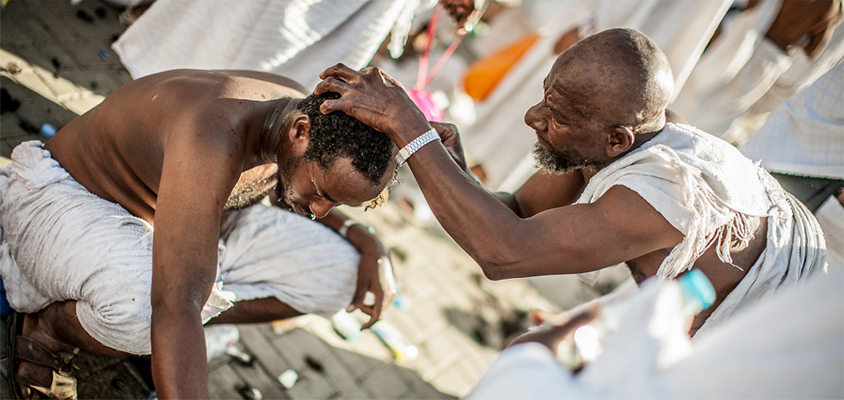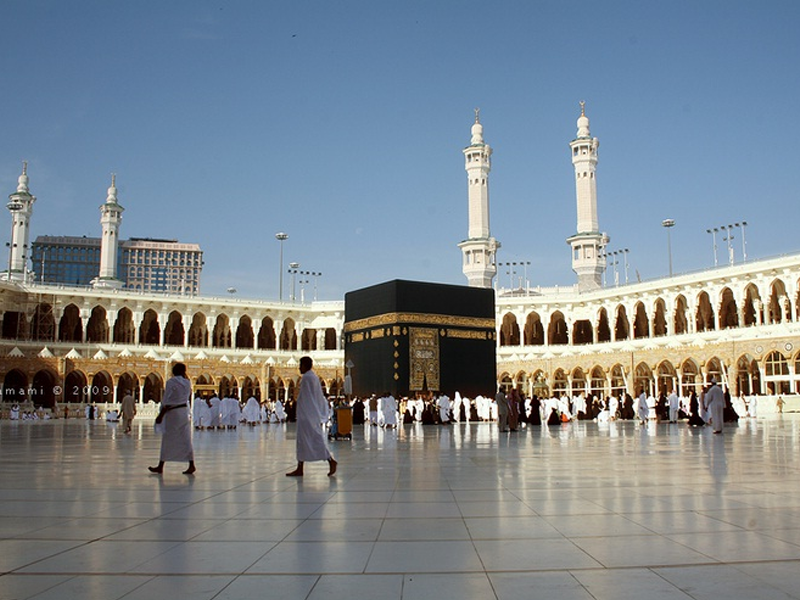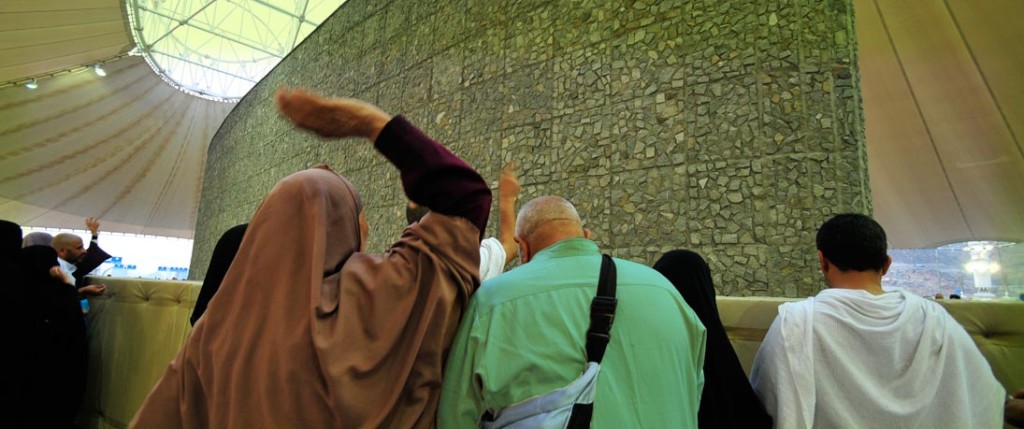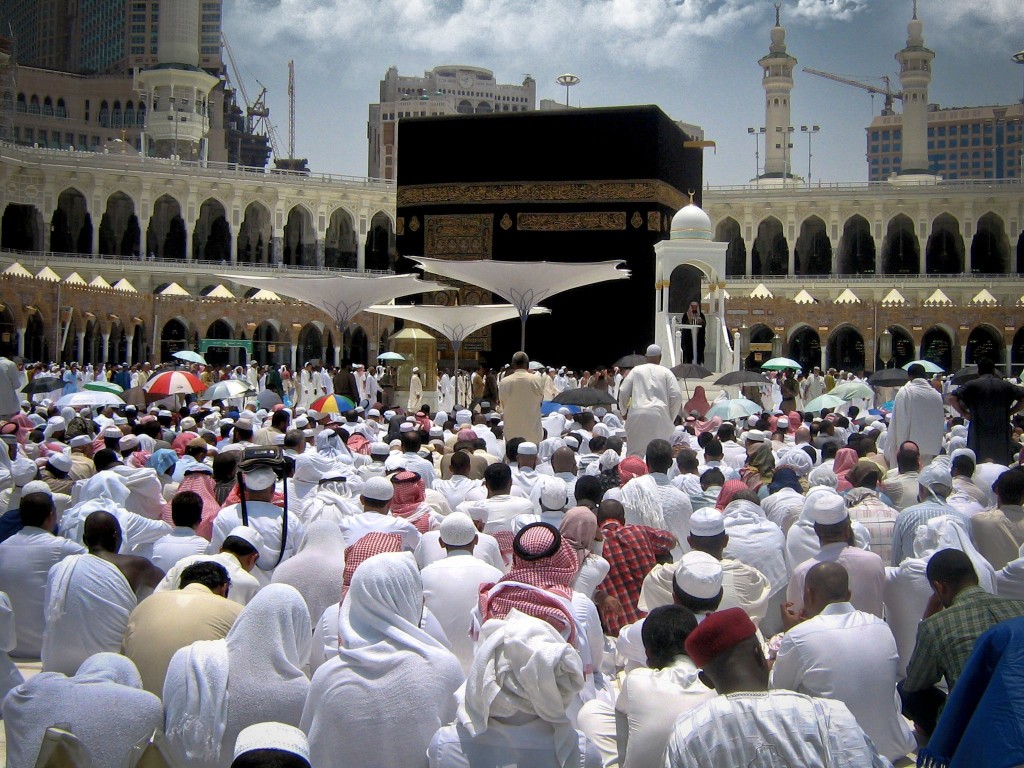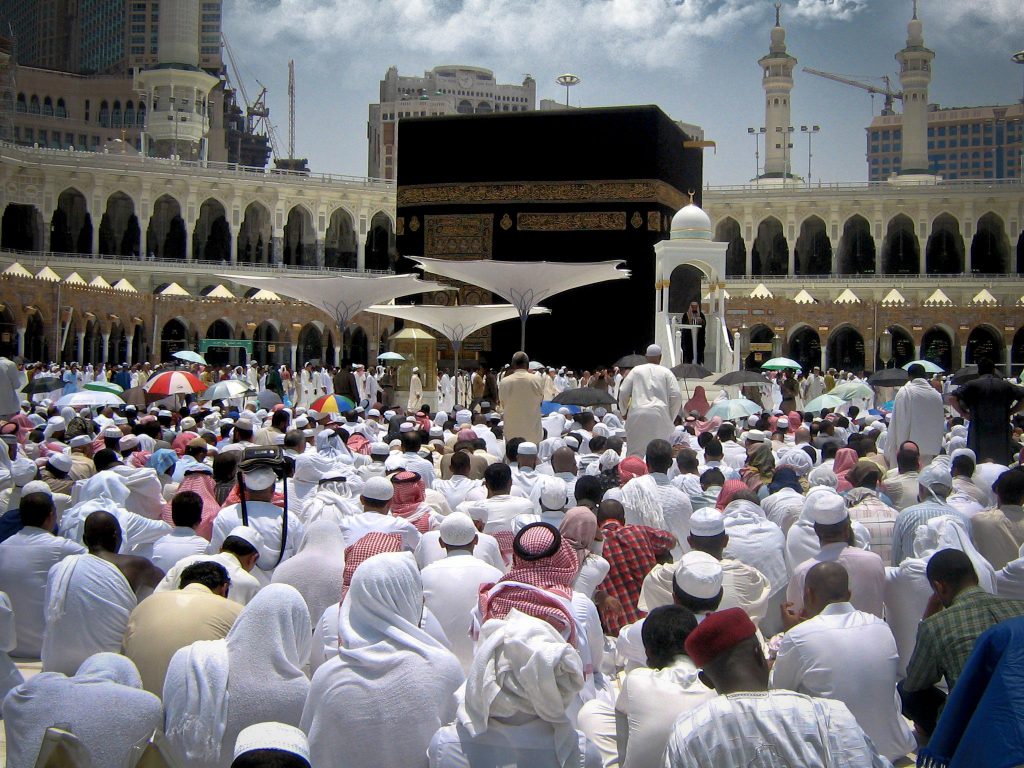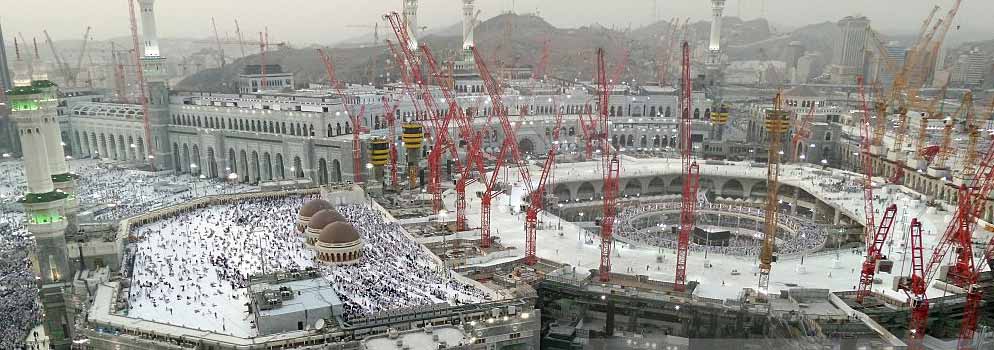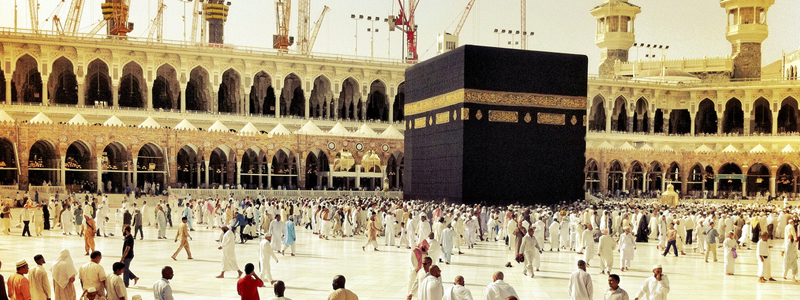
First: Errors Related to Ihram:
First common errors Some pilgrims bypass the designated Station of ihram on their route without either being in Ihram or entering into ihram there, proceeding until they reach Jeddah or some other place within the precincts of the Stations, at which they enter into ihram. This is against the command of Allah’s Messenger ( Sallallahu `Alayhi Wa Sallam ( may Allaah exalt his mention )), which stipulates that every pilgrim should enter into ihram at the Station of ihram which lies on his route.
If this happens to someone, he must either go back to the Station of Ihram lying on his route and there enter into ihram, or he must make expiation by sacrificing a sheep in Makkah and feeding all its meat to the poor.
This applies to all pilgrims regardless of whether one passes the Station of ihram by air, by sea or by land.
If one did not pass through one of the five designated Station of ihram he should enter into ihram at a point which is nearest to the Station of ihram on his route.
Second: Errors Related to Tawaf:
1. Starting the tawaf at some point other than the site of the Black Stone, while it is obligatory to begin tawaf from the Black Stone.
2. Doing one’s tawaf inside the Hijr of Isma’il, which means going around a portion of the K’abah rather than the whole of it since the Hijr of Isma’il is a part of the K’abah which would then be left out of tawaf. Such a tawaf is invalid.
3. Doing ramal (i.e., taking quick short steps) during all seven circuits while ramal is to be done only during the first three of the Tawaf of arrival (tawaf al-qudum).
4. Struggling vehemently to kiss the Black Stone in this process and hitting or pushing people. Such acts, which are injurious to Muslims, are not permissible.
It should be noted that the tawaf remains perfectly valid without kissing the Black Stone. If one does not or cannot kiss the Black Stone, it is sufficient simply to point to it, saying “Allahu akbar” when one comes parallel to it, although one may be at a distance from it.
5. Wiping one’s hand over the Black Stone, seeking “blessings” (barakah) thereby is an innovation (bid’a) with no basis in the Shari’ah of Islam. The Sunnah is to touch it or kiss it only when it can be done easily.
6. Touching the Four Corners of K’abah or its walls, and wiping one’s hands against them. The Prophet (peace be on him) did not touch any part of K’abah except the Black Stone and the Yemeni Corner.
7. Saying specific formulas of supplications reserved for each circuit. The Prophet ( Sallallahu `Alayhi Wa Sallam ( may Allaah exalt his mention )) did not specify any supplications except to say “Allahu akbar” when he reached the Black Stone and, at the end of each circuit between the Yamani Corner and the Black Stone, he said;
“Rabbana, Latina’ fid-Duniya hasanat wa fil-akhirati hasana wa qina adhaban-nar.”
(Our Lord, give us good in this world and good in the Hereafter and save us from the punishment of the Fire).
8. Raising one’s voice above the voices of others: whether in following or leading the tawaf as it causes confusion among the worshippers.
9. Struggling to pray at the Station of Ibrahim. This is contrary to the Sunnah besides being injurious to other worshipers. It is sufficient to pray the two rakyats of tawaf after completing one’s tawaf anywhere within the Sacred Mosque.
Third: Errors Related to Sa’y:
1. When climbing upon Safa and Marwah, some pilgrims face the K’abah and gesticulate toward it with their hands while saying “Allahu Akbar” as if they were saying takbir for salat. This gesticulating is an error because the Prophet (peace be on him) raised him palms only for supplication. Here you may glorify and magnify Allah the Most High, supplicating Him in any words you wish while facing the direction of the K’abah. It is preferable to recite the dhikr which the Prophet (peace be on him) recited at Safa and Marwah.
2. Accelerating one’s pace throughout the entire distance between the two hills. The Sunnah is to accelerate one’s pace only between the two green posts while walking at a normal pace the remainder of the way.
Fourth: Errors Related to ‘Arafat:
1. Some pilgrims camp outside the boundaries of ‘Arafat and remain there until the sun has set; then they depart for Muzdalifah without standing at ‘Arafat properly. This is a serious error which invalidates their hajj since standing in Arafat is the essence of Hajj, and it is obligatory to be within its boundaries and not outside them, if it is not easy to do that, they may enter before sunset and remain there until sunset. It is quite acceptable to stand in Arafat during the night of sacrifice in particular.
2. Departing from ‘Arafat before the sun has set is not permissible, because the messenger of Allah (peace be on him) stayed at ‘Arafat’ until the sun had set completely.
3. Struggling through crowds in order to climb Mount ‘Arafat is not permissible, because it causes much harm and injury to others. The entire Plain of ‘Arafat is a place of standing and neither climbing Mount ‘Arafat nor making salah there has been recommended.
4. Making supplications facing Mount ‘Arafat’ is incorrect because the Sunnah is to face qiblah while making supplication.
5. Making heaps of earth or pebbles: during the day of ‘Arafat’ at particular places, by some people, has no base in the Shariah of Allah.
Fifth: Errors related to Muzdalifah:
1. Some pilgrims start collecting pebbles to throw at the Stone Pillars in Mina as soon as they arrive in Muzdalifah prior to praying the Magrib and Isha prayers. This is not collected at Muzdalifah.
The correct position is that the pebbles can be collected anywhere within the boundaries of al_Haram (the territory or precincts of Makkah). It is known that the Prophet ( Sallallahu `Alayhi Wa Sallam ( may Allaah exalt his mention )) did not ask that the pebbles for Jamratul-Aqabah be picked up for him from Muzdalifah. They were picked up for him, in the morning, after leaving Muzdalifah and on entering Mina. The rest of the pebbles were picked up, for him, from Mina, Too.
2. Some pilgrims wash the pebbles, but this is not recommended.
Sixth: Error Related to Throwing the Pebbles:
Some pilgrims are under the impression that when they are throwing pebbles at the Stone Pillars, they are actually throwing them at shayateen (devils); hence they hurl them with rage and force. However, the throwing of the pebbles has been merely
1. Prescribed as a means of remembering Allah the Most High.
2. Some people throw big stones, shoes or pieces of wood. This is an excess in matters of religion which the Prophet (peace be on him) prohibited, what is allowed is to throw pebbles the size of good beans.
3. Crowding and fighting with others at the Pillars while throwing the pebbles is not permissible. What is prescribed is to be gentle and to throw the pebbles without hurting anyone as much as possible.
4. Throwing all the pebbles at one time is an error. Scholars have said that this would be counted as only one throw. The Shari’ah prescribes throwing the pebbles one by one, saying “Allahu akbar” at each separate throw.
5. Appointing a proxy to throw the pebbles, simply due to fear of the crowds or of hardship, while one is capable of doing it himself. Only sick or weak individuals are permitted to have a proxy for this act.
Seventh: Errors Related to the Farewell Tawaf (Tawaf al-Wada):
1. On the day of their departure, some pilgrims go to Makkah to perform their Farewell Tawaf before throwing the pebbles at the Pillars. Then they return to Mina to throw the pebbles and depart from Mina for their respective countries. Thus their final rite becomes that of throwing the pebbles at the Pillars and not of the tawaf of K’abah. This is an error as the Prophet (peace be on him) said, “No one should depart without his last visit being to the House (K’abah).”
Accordingly, the Farewell Tawaf must take place after one has completed all the rites of Hajj (and before starting his journey for home). After this tawaf, one should not stay in Makkah except during the time it takes to prepare to depart.
2. After finishing the Farewell Tawaf, some people walk backward, facing the K’abah, as they exit from the Sacred Mosque, under the impression that this is a veneration of the K’abah. This act is an innovation (bid’a) in the religion and is without any basis.
3. After finishing the Farewell Tawaf, some pilgrims halt at the door of the Sacred Mosque to make supplications. This is also an innovation with no basis in the Shari’ah of Islam.
Eight: Errors Related to the visit of the Prophet’s Mosque:
1. Touching and wiping one’s hands on the walls and iron grilles, tying threads to the gratings, and other acts of this sort while visiting the grave of the Prophet (may peace and blessings of Allah be on him) in order to receive a blessing (barakah) are an innovation (bid’a). Blessing comes from following what Allah and His Messenger (peace be on him) have prescribed, and not from following innovations.
2. Going to the caves of Mount Uhud or to the caves of Hira or Thaur near Makkah and hanging pieces of cloth or making supplications there have not been prescribed by Allah. All these are unnecessary hardships, innovations in the religion, and are without any basis in the Shari’ah.
3. Likewise, visiting certain sites under the impression that these constitute “relics” of the Prophet (peace be on him), as for example the place where his camel sat, the Well of ‘Uthman or the Well of the Ring, and gathering soil from these places to obtain “blessings”, are all innovations.
4. Calling upon the dead while visiting the graves at the Baqi Cemetery or the graves of the martyrs of Uhud, and throwing coins in order to seek the blessings of the place or of the people buried there, is a grievous error. Indeed, it is shirk (ascribing partners to Allah the Highest), as has been pointed out by scholars. It is clear from the Book of Allah and the Sunnah of His Messenger (peace be on him) that all forms of worship are for Allah alone. It is not permissible to call upon or to offer sacrifice, give vow or any other form of ibadah (worship) except for Allah alone. Allah the Highest, says:
“And they have commanded nothing except to worship Allah (only), purifying the religion for Him alone.” [Quran 98:5]
And He also says:
Verily, the places of worship are for Allah (alone), so do not call on anyone else apart from Allah.” [Quran 72:18]
We ask Allah, the Highest, to improve the condition of the Muslims and to give them an understanding of the religion, and to turn all of us away from errors and deviations Indeed. He is the Hearing, the Responding.
5 Star Hajj Packages & 5 star Umrah Packages: For over a period of 15 years, British Hajj Travel is consistently offering top quality Hajj and Umrah tour packages.
Source: islamweb.net
